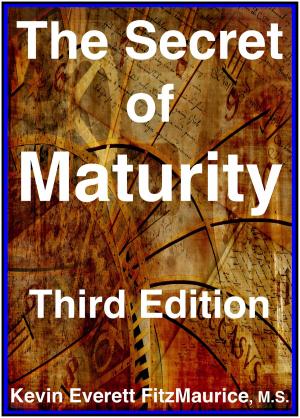3D: Daily Dose of Discernment: 2003-4
Nonfiction, Religion & Spirituality, Philosophy, Eastern, Mind & Body, Inspiration & Meditation, Spirituality| Author: | Kevin Everett FitzMaurice | ISBN: | 9781878693242 |
| Publisher: | FitzMaurice Publishers | Publication: | January 30, 2012 |
| Imprint: | Language: | English |
| Author: | Kevin Everett FitzMaurice |
| ISBN: | 9781878693242 |
| Publisher: | FitzMaurice Publishers |
| Publication: | January 30, 2012 |
| Imprint: | |
| Language: | English |
This book is a collection of sayings for each day of the year 2004. Additionally, there are daily quotations for 2003 starting with the month of June. Each saying is dated in the mathematical fashion, that is, with the numbers in descending-size order. The sayings cover various topics. Topics include psychotherapy, psychology, philosophy, psychological skills, General Semantics, Eastern psychology, Eastern philosophy, meditation, flow, identity, authenticity, responsibility, the nature of self, and social commentary among others. The sayings were originally posted on the authors website. They were edited for this book, and the edited versions now replace the original website versions. Editing was done for typos, grammar, and spelling. Editing was also done for duplicates, clarity of meaning, and precision. However, attempts were made to maintain the original meanings and intentions. You will discover sayings useful to understanding Eastern thought and General Semantics. The agreement between General Semantics and Eastern philosophy is profound, illuminating, and deepens the understanding of both. For instance, the expressions, The description is not the described, and, The thought is not the thing, are found in both Eastern philosophy and General Semantics. Both systems arrive at reality as nonverbal, silent, and beyond comprehension with thought. This despite the fact that one is spiritual and one is atheistic. That two entirely different approaches arrive at the same ultimate conclusions is exciting and enlightening. You will find the sayings herein amusing, helpful, interesting, and thought provoking. Many of the sayings are like Zen koans; if you sit with them, they reveal the other side free of words. Many of the sayings are open to multiple interpretations and meanings. New meanings will arrive on different journeys through the book. The same insight shared different ways helps you not to miss deeper felt experiences for simpler surface meanings. It often happens that a slight change in wording allows someone to drop their mind long enough to hear something fresh. One persons, Thats obvious, is another persons ah-ha moment. Let the sayings pass that dont open to you now. Focus on the sayings that bring stillness. Listen beyond the words. Feel, rather than think, the sayings through. Sense, rather than think, the music behind the words. Manage to touch the energy behind the words, and your heart will be touched. Find what you will. Take what you want and leave the rest to leaven. Pithy sayings can be either instantly helpful or meaningless. Often the best results from sayings or aphorisms come after they have grown slowly in the garden of your mind. Ideas you may reject at first can come to have more meaning in time. Aphorisms that make no sense today can suddenly reveal themselves to you years later. Some sayings can follow and teach you for a lifetime. For example, Drink from your own well, has taught the author again and again for decades. Making yourself contemplate a saying you do not understand can reveal much about your thinking styles. Is it the saying or your lack of openness that is cold? Feeling your way to the inside meat of a saying is the best approach. It is important to understand the usage of the word change in this book. Change is considered an impossibility for psychological entities such as thoughts, feelings, and sensations. However, sometimes the book recommends change or describes how to change. This is consistent because change can have the meaning of transforming into something else, which is wrong for psychological usage. And change can also have the meaning of switching to something else, which is right for psychological usage. You do not change your dog into a cat. You can change from having a dog to having a cat. You change your shirt by switching to a different shirt, not by mutating your current shirt into another shirt. Switch, not change. Or change in the sense of turning, shifting, transferring, or redirecting, not evolving. More discussion on change can be found in Attitude Is All You Need! Second Edition. If you are interested in quotations, then please visit the authors website. There you will find lists of quotations organized by topic. If you find quotations intriguing, but not fulfilling, then please examine some of the authors other works catalogued at the end of the book in the section Books Alphabetically by Author. The author has read and studied innumerable quotations by others. Sometimes, these quotations have been absorbed into the authors thinking and so are repeated in the authors words. If any quotations of the authors appear too close to those of another, then it should be considered a compliment to the other. The author copies and repeats his own sayings too. The author has no shortage of original quotations, hence, repetition of the sayings of others is a tribute to them. The authors works offer six different approaches to self-help. (1) In Breathe, you discover methods for congruence, self-relaxation, self-calming, and self-centering. (2) In Garden, you discover methods for sorting out what thoughts work for you and what thoughts work against you. You also learn how to increase your productive thoughts and to decrease your unproductive thoughts. (3) In Not, you discover methods to stop using the number one mistake that underlies failure. You also learn how to be a more effective parent or leader. (4) In Ego, you discover methods to reduce your devotion to and dependence on ego. You also learn how to be free, happy, and more creative. (5) In Attitude Is All You Need!, you discover methods to sort out what attitudes are working for you and what attitudes are working against you. You also learn how to increase your productive attitudes and how to decrease your unproductive attitudes. (6) In the five books Something For Nothing, Anything Goes, Acid Test, 3D: Daily Dose of Discernment: 2005, and 3D: Daily Dose of Discernment: 2003-4 you are given sayings and aphorism to use for introspection, contemplation, and meditation. Please experiment until you find the one or two approaches that work best for you. Worry not if the approaches are the best for anyone else.
This book is a collection of sayings for each day of the year 2004. Additionally, there are daily quotations for 2003 starting with the month of June. Each saying is dated in the mathematical fashion, that is, with the numbers in descending-size order. The sayings cover various topics. Topics include psychotherapy, psychology, philosophy, psychological skills, General Semantics, Eastern psychology, Eastern philosophy, meditation, flow, identity, authenticity, responsibility, the nature of self, and social commentary among others. The sayings were originally posted on the authors website. They were edited for this book, and the edited versions now replace the original website versions. Editing was done for typos, grammar, and spelling. Editing was also done for duplicates, clarity of meaning, and precision. However, attempts were made to maintain the original meanings and intentions. You will discover sayings useful to understanding Eastern thought and General Semantics. The agreement between General Semantics and Eastern philosophy is profound, illuminating, and deepens the understanding of both. For instance, the expressions, The description is not the described, and, The thought is not the thing, are found in both Eastern philosophy and General Semantics. Both systems arrive at reality as nonverbal, silent, and beyond comprehension with thought. This despite the fact that one is spiritual and one is atheistic. That two entirely different approaches arrive at the same ultimate conclusions is exciting and enlightening. You will find the sayings herein amusing, helpful, interesting, and thought provoking. Many of the sayings are like Zen koans; if you sit with them, they reveal the other side free of words. Many of the sayings are open to multiple interpretations and meanings. New meanings will arrive on different journeys through the book. The same insight shared different ways helps you not to miss deeper felt experiences for simpler surface meanings. It often happens that a slight change in wording allows someone to drop their mind long enough to hear something fresh. One persons, Thats obvious, is another persons ah-ha moment. Let the sayings pass that dont open to you now. Focus on the sayings that bring stillness. Listen beyond the words. Feel, rather than think, the sayings through. Sense, rather than think, the music behind the words. Manage to touch the energy behind the words, and your heart will be touched. Find what you will. Take what you want and leave the rest to leaven. Pithy sayings can be either instantly helpful or meaningless. Often the best results from sayings or aphorisms come after they have grown slowly in the garden of your mind. Ideas you may reject at first can come to have more meaning in time. Aphorisms that make no sense today can suddenly reveal themselves to you years later. Some sayings can follow and teach you for a lifetime. For example, Drink from your own well, has taught the author again and again for decades. Making yourself contemplate a saying you do not understand can reveal much about your thinking styles. Is it the saying or your lack of openness that is cold? Feeling your way to the inside meat of a saying is the best approach. It is important to understand the usage of the word change in this book. Change is considered an impossibility for psychological entities such as thoughts, feelings, and sensations. However, sometimes the book recommends change or describes how to change. This is consistent because change can have the meaning of transforming into something else, which is wrong for psychological usage. And change can also have the meaning of switching to something else, which is right for psychological usage. You do not change your dog into a cat. You can change from having a dog to having a cat. You change your shirt by switching to a different shirt, not by mutating your current shirt into another shirt. Switch, not change. Or change in the sense of turning, shifting, transferring, or redirecting, not evolving. More discussion on change can be found in Attitude Is All You Need! Second Edition. If you are interested in quotations, then please visit the authors website. There you will find lists of quotations organized by topic. If you find quotations intriguing, but not fulfilling, then please examine some of the authors other works catalogued at the end of the book in the section Books Alphabetically by Author. The author has read and studied innumerable quotations by others. Sometimes, these quotations have been absorbed into the authors thinking and so are repeated in the authors words. If any quotations of the authors appear too close to those of another, then it should be considered a compliment to the other. The author copies and repeats his own sayings too. The author has no shortage of original quotations, hence, repetition of the sayings of others is a tribute to them. The authors works offer six different approaches to self-help. (1) In Breathe, you discover methods for congruence, self-relaxation, self-calming, and self-centering. (2) In Garden, you discover methods for sorting out what thoughts work for you and what thoughts work against you. You also learn how to increase your productive thoughts and to decrease your unproductive thoughts. (3) In Not, you discover methods to stop using the number one mistake that underlies failure. You also learn how to be a more effective parent or leader. (4) In Ego, you discover methods to reduce your devotion to and dependence on ego. You also learn how to be free, happy, and more creative. (5) In Attitude Is All You Need!, you discover methods to sort out what attitudes are working for you and what attitudes are working against you. You also learn how to increase your productive attitudes and how to decrease your unproductive attitudes. (6) In the five books Something For Nothing, Anything Goes, Acid Test, 3D: Daily Dose of Discernment: 2005, and 3D: Daily Dose of Discernment: 2003-4 you are given sayings and aphorism to use for introspection, contemplation, and meditation. Please experiment until you find the one or two approaches that work best for you. Worry not if the approaches are the best for anyone else.















